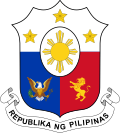"Dagdag-Bawas" scam
As the counting of votes was ongoing on May 11, former Senator Aquilino Pimentel Jr. alleged that some senatorial candidates currently outside the unfinished tally's top twelve spots were beginning to rig votes by bribing people involved in the electoral process. [1] Pimentel also shared that two of his fellow Lakas-Laban senatorial candidates revealed to him that a vote-buying scam called "Oplan Dagdag-Bawas" (lit. 'Add-Subtract') was occurring in Mindanao, where canvassers are bribed to shave off votes meant for Pimentel and transfer them to other candidates. [2] Pimentel later admitted that he lacks evidence for his claim, while a Comelec commissioner named Regalado Maambong dismissed the allegation as false. [3] After the election, Pimentel established the Foundation for Clean Elections, Inc. in Mandaluyong, Metro Manila to help prevent fraud in the country's elections. [4]
By late 1995, the Senate Electoral Tribunal ordered to deduct more than 58,000 "unlawfully credited" votes for Juan Ponce Enrile in Bataan and Isabela from his tally, alongside 10,000 votes for Gringo Honasan and 7,000 votes for Ramon Mitra. [5]
In May 1996, Maambong reversed his stance from the previous year and revealed that Comelec has found evidence of widespread cheating during the election. [6] Resureccion Borra, then executive director of Comelec, later stated that the 1995 election was the first time "dagdag-bawas" was committed on a massive scale, and announced that they will attempt to prosecute canvassers in the provinces of Ilocos Norte, Isabela, Bataan, and Lanao del Sur. [7] [8] In July 1996, Senator Serge Osmeña revealed that he discovered a 30,000 vote discrepancy for him in Pasig City between the manual tally done by the Treasurer's Office and the certificates of canvass. [9] By December, a regional trial court in Bataan ordered for the arrest of Cenon Uy, an assistant regional director for Comelec in Central Luzon, for having allegedly tampered with election results in the region to favor the candidacy of Enrile, [10] though he would remain in office until late 2000 when a pending court case against him forced his resignation. [11]
On February 10, 2000, Antonio Llorente and Ligaya Salayon, who were respectively Pasig City prosecutor and member of the Pasig board of canvassers at the time of the election, was charged by the Supreme Court for violating election laws after they admitted their "honest mistake" of taking away votes from Pimentel and transferring them to Enrile. [12] Llorente eventually went on indefinite leave from his position as Justice Undersecretary in September due to the Supreme Court standing by its ruling. [13]
On September 11, 2000, Arsenia Garcia, who was chair of the Alaminos, Pangasinan municipal canvassers during the election, was convicted of electoral fraud by a Regional Trial Court in Alaminos due to her discarding more than 5,000 votes that were in favor of Pimentel, and sentenced to six years in prison. [14]

